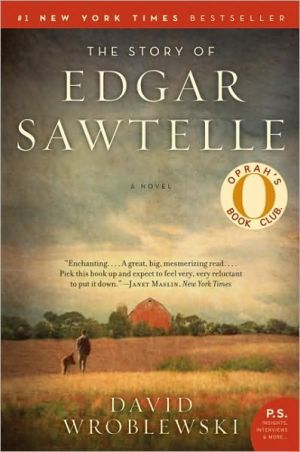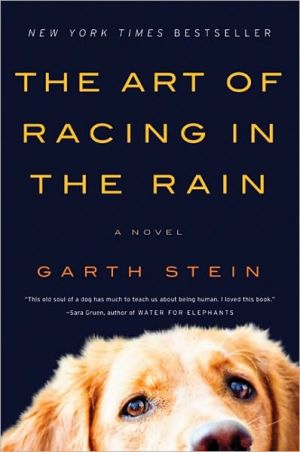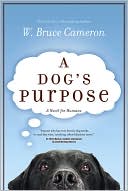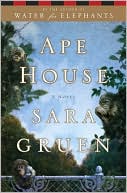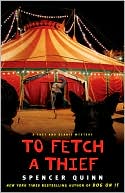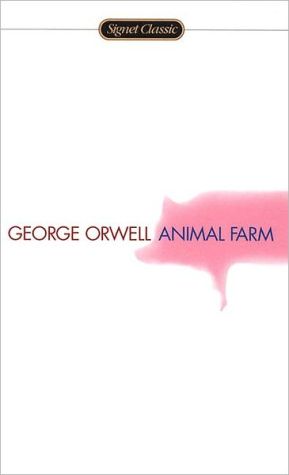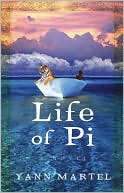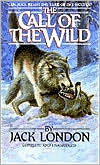The Story of Edgar Sawtelle
"Born mute, speaking only in sign, Edgar Sawtelle leads an idyllic life with his parents on their farm in remote northern Wisconsin. For generations, the Sawtelles have raised and trained a fictional breed of dog whose thoughtful companionship is epitomized by Almondine, Edgar's lifelong friend and ally. But with the unexpected return of Claude, Edgar's paternal uncle, turmoil consumes the Sawtelles' once peaceful home. When Edgar's father dies suddenly, Claude insinuates himself into the...
Search in google:
The extraordinary debut novel that became a modern classic Born mute, speaking only in sign, Edgar Sawtelle leads an idyllic life with his parents on their farm in remote northern Wisconsin. For generations, the Sawtelles have raised and trained a fictional breed of dog whose remarkable gift for companionship is epitomized by Almondine, Edgar's lifelong friend and ally. Edgar seems poised to carry on his family's traditions, but when catastrophe strikes, he finds his once-peaceful home engulfed in turmoil. Forced to flee into the vast wilderness lying beyond the Sawtelle farm, Edgar comes of age in the wild, fighting for his survival and that of the three yearling dogs who accompany him, until the day he is forced to choose between leaving forever or returning home to confront the mysteries he has left unsolved. Filled with breathtaking scenes—the elemental north woods, the sweep of seasons, an iconic American barn, a fateful vision rendered in the falling rain—The Story of Edgar Sawtelle is a meditation on the limits of language and what lies beyond, a brilliantly inventive retelling of an ancient story, and an epic tale of devotion, betrayal, and courage in the American heartland.The Washington Post - Ron CharlesSit. Stay. Read. The dog days of summer are nigh, and here is a big-hearted novel you can fall into, get lost in and finally emerge from reluctantly, a little surprised that the real world went on spinning while you were absorbed. You haven't heard of the author. David Wroblewski is a 48-year-old software developer in Colorado, and this is his first novel. It's being released with the kind of hoopla once reserved for the publishing world's most established authors. No wonder: The Story of Edgar Sawtelle is an enormous but effortless read, trimmed down to the elements of a captivating story about a mute boy and his dogs. That sets off alarm bells, I know: Handicapped kids and pets can make a toxic mix of sentimentality. But Wroblewski writes with such grace and energy that Edgar Sawtelle never succumbs to that danger. Inspired improbably by the plot of Shakespeare's "Hamlet," this Midwestern tale manages to be both tender and suspenseful.
I\ \ In the year 1919, Edgar’s grandfather, who was born with an extra share of whimsy, bought their land and all the buildings on it from a man he’d never met, a man named Schultz, who in his turn had walked away from a logging team half a decade earlier after seeing the chains on a fully loaded timber sled let go. Twenty tons of rolling maple buried a man where Schultz had stood the moment before. As he helped unpile logs to extract the wretched man’s remains, Schultz remembered a pretty parcel of land he’d spied north and west of Mellen. The morning he signed the papers he rode one of his ponies along the logging road to his new property and picked out a spot in a clearing below a hill and by nightfall a workable pole stable stood on that ground. The next day he fetched the other pony and filled a yoked cart with supplies and the three of them walked back to his crude homestead, Schultz on foot, reins in hand, and the ponies in harness behind as they drew the cart along and listened to the creak of the dry axle. For the first few months he and the ponies slept side by side in the pole shed and quite often in his dreams Schultz heard the snap when the chains on that load of maple broke. He tried his best to make a living there as a dairy farmer. In the five years he worked the land, he cleared one twenty-five-acre field and drained another, and he used the lumber from the trees he cut to build an outhouse, a barn, and a house, in that order. So that he wouldn’t need to go outside to tote water, he dug his well in the hole that would become the basement of the house. He helped raise barns all the way from Tannery Town to Park Falls so there’d be plenty of help when his time came. And day and night he pulled stumps. That first year he raked and harrowed the south field a dozen times until even his ponies seemed tired of it. He stacked rocks at the edges of the fields in long humped piles and burned stumps in bonfires that could be seen all the way from Popcorn Corners—the closest town, if you called that a town—and even Mellen. He managed to build a small stone-and-concrete silo taller than the barn, but he never got around to capping it. He mixed milk and linseed oil and rust and blood and used the concoction to paint the barn and outhouse red. In the south field he planted hay, and in the west, corn, because the west field was wet and the corn would grow faster there. During his last summer on the farm he even hired two men from town. But when autumn was on the horizon, something happened—no one knew just what—and he took a meager early harvest, auctioned off his livestock and farm implements, and moved away, all in the space of a few weeks. At the time, John Sawtelle was traveling up north with no thought or intention of buying a farm. In fact, he’d put his fishing tackle into the Kissel and told Mary, his wife, he was delivering a puppy to a man he’d met on his last trip. Which was true, as far as it went. What he didn’t mention was that he carried a spare collar in his pocket. THAT SPRING THEIR DOG, Violet, who was good but wild-hearted, had dug a hole under the fence when she was in heat and run the streets with romance on her mind. They’d ended up chasing a litter of seven around the backyard. He could have given all the pups away to strangers, and he suspected he was going to have to, but the thing was, he liked having those pups around. Liked it in a primal, obsessive way. Violet was the first dog he’d ever owned, and the pups were the first pups he’d ever spent time with, and they yapped and chewed on his shoelaces and looked him in the eye. At night he found himself listening to records and sitting on the grass behind the house and teaching the pups odd little tricks they soon forgot while he and Mary talked. They were newlyweds, or almost. They sat there for hours and hours, and it was the finest time so far in his life. On those nights, he felt connected to something ancient and important that he couldn’t name. But he didn’t like the idea of a stranger neglecting one of Vi’s pups. The best thing would be if he could place them all in the neighborhood so he could keep tabs on them, watch them grow up, even if from a distance. Surely there were half a dozen kids within an easy walk who wanted a dog. People might think it peculiar, but they wouldn’t mind if he asked to see the pups once in while. Then he and a buddy had gone up to the Chequamegon, a long drive but worth it for the fishing. Plus, the Anti-Saloon League hadn’t yet penetrated the north woods, and wasn’t likely to, which was another thing he admired about the area. They’d stopped at The Hollow, in Mellen, and ordered a beer, and as they talked a man walked in followed by a dog, a big dog, gray and white with brown patches, some mix of husky and shepherd or something of that kind, a deep-chested beast with a regal bearing and a joyful, jaunty carriage. Every person in the bar seemed to know the dog, who trotted around greeting the patrons. “That’s a fine looking animal,” John Sawtelle remarked, watching it work the crowd for peanuts and jerky. He offered to buy the dog’s owner a beer for the pleasure of an introduction. “Name’s Captain,” the man said, flagging down the bartender to collect. With beer in hand he gave a quick whistle and the dog trotted over. “Cappy, say hello to the man.” Captain looked up. He lifted a paw to shake. That he was a massive dog was the first thing that impressed Edgar’s grandfather. The second thing was less tangible—something about his eyes, the way the dog met his gaze. And, gripping Captain’s paw, John Sawtelle was visited by an idea. A vision. He’d spent so much time with pups lately he imagined Captain himself as a pup. Then he thought about Vi—who was the best dog he’d ever known until then—and about Captain and Vi combined into one dog, one pup, which was a crazy thought because he had far too many dogs on his hands already. He released Captain’s paw and the dog trotted off and he turned back to the bar and tried to put that vision out of his mind by asking where to find muskie. They weren’t hitting out on Clam Lake. And there were so many little lakes around. The next morning, they drove back into town for breakfast. The diner was situated across the street from the Mellen town hall, a large squarish building with an unlikely looking cupola facing the road. In front stood a white, three-tiered drinking fountain with one bowl at person height, another lower, for horses, and a small dish near the ground whose purpose was not immediately clear. They were about to walk into the diner when a dog rounded the corner and trotted nonchalantly past. It was Captain. He was moving in a strangely light-footed way for such a solidly constructed dog, lifting and dropping his paws as if suspended by invisible strings and merely paddling along for steering. Edgar’s grandfather stopped in the diner’s doorway and watched. When Captain reached the front of the town hall, he veered to the fountain and lapped from the bowl nearest the ground. “Come on,” his buddy said. “I’m starving.” From along the alley beside the town hall came another dog, trailing a half-dozen pups behind. She and Captain performed an elaborate sashay, sniffing backsides and pressing noses into ruffs, while the pups bumbled about their feet. Captain bent to the little ones and shoved his nose under their bellies and one by one rolled them. Then he dashed down the street and turned and barked. The pups scrambled after him. In a few minutes, he’d coaxed them back to the fountain, spinning around in circles with the youngsters in hot pursuit while the mother dog stretched out on the lawn and watched, panting. A woman in an apron walked out the door of the diner, squeezed past the two men, and looked on. “That’s Captain and his lady,” she said. “They’ve been meeting there with the kids every morning for the last week. Ever since Violet’s babies got old enough to get around.” “Whose babies?” Edgar’s grandfather said. “Why, Violet’s.” The woman looked at him as if he were an idiot. “The mama dog. That dog right there.” “I’ve got a dog named Violet,” he said. “And she has a litter about that age right this moment back home.” “Well, what do you know,” the woman said, without the slightest note of interest. “I mean, don’t you think that’s sort of a coincidence? That I’d run into a dog with my own dog’s name, and with a litter the same age?” “I couldn’t say. Could be that sort of thing happens all the time.” “Here’s a coincidence happens every morning,” his buddy interjected. “I wake up, I get hungry, I eat breakfast. Amazing.” “You go ahead,” John Sawtelle said. “I’m not all that hungry anyway.” And with that, he stepped into the dusty street and crossed to the town hall. WHEN HE FINALLY SAT DOWN for breakfast, the waitress appeared at their table with coffee. “If you’re so interested in those pups, Billy might sell you one,” she said. “He can’t hardly give ’em away, there’s so many dogs around here.” “Who’s Billy?” She turned and gestured in the direction of the sit-down counter. There, on one of the stools, sat Captain’s owner, drinking a cup of coffee and reading the Sentinel. Edgar’s grandfather invited the man to join them. When they were seated, he asked Billy if the pups were indeed his. “Some of them,” Billy said. “Cappy got old Violet in a fix. I’ve got to find a place for half the litter. But what I really think I’ll do is keep ’em. Cap dotes on ’em, and ever since my Scout ran off last summer I’ve only had the one dog. He gets lonely.” Edgar’s grandfather explained about his own litter, and about Vi, ex- panding on her qualities, and then he offered to trade a pup for a pup. He told Billy he could have the pick of Vi’s litter, and furthermore could pick which of Captain’s litter he’d trade for, though a male was preferable if it was all the same. Then he thought for a moment and revised his equest: he’d take the smartest pup Billy was willing to part with, and he didn’t care if it was male or female. “Isn’t the idea to reduce the total number of dogs at your place?” his buddy said. “I said I’d find the pups a home. That’s not exactly the same thing.” “I don’t think Mary is going to see it that way. Just a guess there.” Billy sipped his coffee and suggested that, while interested, he had reservations about traveling practically the length of Wisconsin just to pick out a pup. Their table was near the big front window and, from there, John Sawtelle could see Captain and his offspring rolling around on the grass. He watched them awhile, then turned to Billy and promised he’d pick out the best of Vi’s litter and drive it up—male or female, Billy’s choice. And if Billy didn’t like it, then no trade, and that was a fair deal. Which was how John Sawtelle found himself driving to Mellen that September with a pup in a box and a fishing rod in the back seat, whistling “Shine On, Harvest Moon.” He’d already decided to name the new pup Gus if the name fit. Billy and Captain took to Vi’s pup at once. The two men walked into Billy’s backyard to discuss the merits of each of the pups in Captain’s litter and after a while one came bumbling over and that decided things. John Sawtelle put the spare collar on the pup and they spent the afternoon parked by a lake, shore fishing. Gus ate bits of sunfish roasted on a stick and they slept there in front of a fire, tethered collar to belt by a length of string. The next day, before heading home, Edgar’s grandfather thought he’d drive around a bit. The area was an interesting mix: the logged-off parts were ugly as sin, but the pretty parts were especially pretty. Like the falls. And some of the farm country to the west. Most especially, the hilly woods north of town. Besides, there were few things he liked better than steering the Kissel along those old back roads. Late in the morning he found himself navigating along a heavily washboarded dirt road. The limbs of the trees meshed overhead. Left and right, thick underbrush obscured everything farther than twenty yards into the woods. When the road finally topped out at a clearing, he was presented with a view of the Penokee range rolling out to the west, and an unbroken emerald forest stretching to the north—all the way, it seemed, to the granite rim of Lake Superior. At the bottom of the hill stood a little white farmhouse and a gigantic red barn. A milk house was huddled up near the front of the barn. An untopped stone silo stood behind. By the road, a crudely lettered sign read, “For Sale.” He pulled into the rutted drive. He parked and got out and peered through the living room windows. No one was home. The house looked barely finished inside. He stomped through the fields with Gus in his arms and when he got back he plunked himself down on the running board of the Kissel and watched the autumn clouds soar above. John Sawtelle was a tremendous reader and letter writer. He especially loved newspapers from faraway cities. He’d recently happened across an article describing a man named Gregor Mendel—a Czechoslovakian monk, of all things—who had done some very interesting experiments with peas. Had demonstrated, for starters, that he could predict how the offspring of his plants would look—the colors of their flowers and so on. Mendelism, this was being called: the scientific study of heredity. The article had dwelt upon the stupendous implications for the breeding of livestock. Edgar’s grandfather had been so fascinated that he’d gone to the library and located a book on Mendel and read it cover to cover. What he’d learned occupied his mind in odd moments. He thought back on the vision (if he could call it that) that had descended upon him as he shook Captain’s paw at The Hollow. It was one of those rare days when everything in a person’s life feels connected. He was twenty-five years old, but over the course of the last year his hair had turned steely gray. The same thing had happened to his grandfather, yet his father was edging up on seventy with a jet black mane. Nothing of the kind had happened to either of his elder brothers, though one was bald as an egg. Nowadays when John Sawtelle looked into the mirror he felt a little like a Mendelian pea himself. He sat in the sun and watched Gus, thick-legged and clumsy, pin a grasshopper to the ground, mouth it, then shake his head with disgust and lick his chops. He’d begun smothering the hopper with the side of his neck when he suddenly noticed Edgar’s grandfather looking on, heels set in the dirt driveway, toes pointed skyward. The pup bucked in mock surprise, as if he’d never seen this man before. He scrambled forward to investigate, twice going tail over teakettle as he closed the gap. It was, John Sawtelle thought, a lovely little place. Explaining Gus to his wife was going to be the least of his worries. IN FACT, IT DIDN’T TAKE LONG for the fuss to die down. When he wanted to, Edgar’s grandfather could radiate a charming enthusiasm, one of the reasons Mary had been attracted to him in the first place. He could tell a good story about the way things were going to be. Besides, they had been living in her parents’ house for over a year and she was as eager as he to get out on her own. They completed the purchase of the land by mail and telegram. This the boy Edgar would come to know because his parents kept their most important documents in an ammunition box at the back of their bedroom closet. The box was military gray, with a big clasp on the side, and it was metal, and therefore mouseproof. When they weren’t around he’d sneak it out and dig through the contents. Their birth certificates were in there, along with a marriage certificate and the deed and history of ownership of their land. But the telegram was what interested him most—a thick, yellowing sheet of paper with a Western Union legend across the top, its message consisting of just six words, glued to the backing in strips: OFFER ACCEPTED SEE ADAMSKI RE PAPERS. Adamski was Mr. Schultz’s lawyer; his signature appeared on several documents in the box. The glue holding those words to the telegram had dried over the years, and each time Edgar snuck it out, another word dropped off. The first to go was papers, then re, then see. Eventually Edgar stopped taking the telegram out at all, fearing that when accepted fluttered into his lap, his family’s claim to the land would be reversed. He didn’t know what to do with the liberated words. It seemed wrong to throw them away, so he dropped them into the ammo box and hoped no one would notice.
\ From Barnes & NobleBarnes & Noble Discover Great New Writers\ What is the essence of a dog? What is the meaning of a life? Edgar Sawtelle seeks to answer these questions in Wroblewski's startlingly compelling, original, and yes, classic epic -- a truly American novel guaranteed to win countless hearts. \ \ Edgar lives a hard yet satisfying life breeding and training dogs with his parents on their northern Wisconsin farm. They're continuing the work of Edgar's grandfather, who created a new breed of dog -- bred not for work or appearance but to embody the ineffable qualities of companionship and wisdom. Edgar has a mysterious bond with the Sawtelle dogs. Like them, he can hear and see and comprehend, but he cannot speak. He talks to the dogs in signs, and they respond to him. \ \ Edgar's idyll on the farm is interrupted with the appearance of his uncle, who resents Edgar's father, and wants to usurp him. Evoking Hamlet, the biblical story of Cain and Abel, and Homer's Odyssey to tell the story of Edgar's harrowing journey from the safety of his home through the Chequamegon Forest and back again with his extraordinary canine companions, Wroblewski depicts a world -- not so different from our own -- where dogs teach their human counterparts far more than humans teach them, and together, they find meaning. (Fall 2008 Selection)\ \ \ \ \ Capital Times (Madison“This luminescent story has the kind of sprawling, wide-lens focus that readers think of when they talk about the so-called ‘great American novel.’”\ \ \ Ron CharlesSit. Stay. Read. The dog days of summer are nigh, and here is a big-hearted novel you can fall into, get lost in and finally emerge from reluctantly, a little surprised that the real world went on spinning while you were absorbed. You haven't heard of the author. David Wroblewski is a 48-year-old software developer in Colorado, and this is his first novel. It's being released with the kind of hoopla once reserved for the publishing world's most established authors. No wonder: The Story of Edgar Sawtelle is an enormous but effortless read, trimmed down to the elements of a captivating story about a mute boy and his dogs. That sets off alarm bells, I know: Handicapped kids and pets can make a toxic mix of sentimentality. But Wroblewski writes with such grace and energy that Edgar Sawtelle never succumbs to that danger. Inspired improbably by the plot of Shakespeare's "Hamlet," this Midwestern tale manages to be both tender and suspenseful.\ —The Washington Post\ \ \ \ \ Publishers WeeklyThis sprawling epic tale clocks in at 22 hours, but is well worth the time spent. Wroblewski captivates with a story of a young boy and his dogs cast into the wilderness after his father is murdered in rural Wisconsin. Richard Poe reads with a firm voice, both gripping and personal, fitting for this particular tale. Poe brings the story to life with such ease that listeners will forget they aren't actually reading the book. Steady pacing, realistic and imaginative characters and Poe's skilled performance make this a recording that (even at its length) listeners will want to hear again. This is an instant classic that will resonate for years to come. An Ecco hardcover (Reviews, Feb. 18).(Sept.)\ Copyright © Reed Business Information, a division of Reed Elsevier Inc. All rights reserved.\ \ \ \ \ VOYA\ - Sarah Hill\ The Sawtelles from northern Wisconsin are known throughout the United States for their amazingly behaved dogs. The family has bred dogs for generations, and Edgar Sawtelle's parents run the kennel. Edgar is mute, but that fact does not hurt him at all. His parents read his sign language, and Edgar trains the dogs well. But the idyllic world of Edgar and his parents is shattered when Edgar's Uncle Claude returns to the farm. Claude is trouble but manages to worm his way into the family when Edgar's father unexpectedly passes away. Something is not right with Claude, and the suspense builds as Edgar builds his case against his uncle. An unfortunate accident sends Edgar into hiding in the woods, with only his dogs to keep him company. The ending is shocking-this reviewer had to reread it-but helps create a breathtaking novel. This adult novel is chock full of beautiful writing-almost too much, creating a lengthy read. But young adults will appreciate the soft, comprehensive setting of the dog farm and Edgar's communication with the animals. Almondine, the family dog, helped raise Edgar and spoke for him when Edgar could not. Some chapters are from her point-of-view and are absolutely stunning. Wroblewski builds a setting where readers feel at home and creates a family for which they truly care. Although not a novel for immature readers, more advanced young adults will value the quiet subtlety and shocking ending and appreciate the details of training the work dogs. Reviewer: Sarah Hill\ \ \ \ \ Library JournalWroblewski's lyrical debut novel, about a young boy who runs away from home and into the Wisconsin backwoods with the loyal dogs he helped raise, is now available as an audio production, and Recorded Books couldn't have done a better job with it. Narrating is actor Richard Poe (The Sportswriter), whose readings are consistently strong, and whose deep, rumbling, assonant voice perfectly suits this psychologically complex and ultimately heartwarming material. An essential and rewarding purchase for all libraries. [With tracks every three minutes for bookmarking; audio clip available through www.audible.com; the Ecco hc received a starred review, LJ3/15/08; was both an Oprah's Book Club and a Barnes & Noble Discover selection; and was ranked #1 on the New York Times bestsellers list.-Ed.]—Raya Kuzyk\ \ \ \ \ Kirkus ReviewsA stately, wonderfully written debut novel that incorporates a few of the great archetypes: a disabled but resourceful young man, a potential Clytemnestra of a mom and a faithful dog. Writing to such formulas, with concomitant omniscience and world-weariness, has long been the stuff of writing workshops. Wroblewski is the product of one such place, but he seems to have forgotten much of what he learned there: He takes an intense interest in his characters; takes pains to invest emotion and rough understanding in them; and sets them in motion with graceful language (and, in eponymous young Edgar's case, sign language). At the heart of the book is a pup from an extremely rare breed, thanks to a family interest in Mendelian genetics; so rare is Almondine, indeed, that she finds ways to communicate with Edgar that no other dog and human, at least in literature, have yet worked out. Edgar may be voiceless, but he is capable of expressing sorrow and rage when his father suddenly dies, and Edgar decides that his father's brother, who has been spending a great deal of time with Edgar's mother, is responsible for the crime. That's an appropriately tragic setup, and Edgar finds himself exiled to the bleak wintry woods-though not alone, for he is now the alpha of his own very special pack. The story takes Jungle Book-ish turns: "He blinked at the excess moonlight in the clearing and clapped for the dogs. High in the crown of a charred tree, an owl covered its dished face, and one branch down, three small replicas followed. Baboo came at once. Tinder had begun pushing into the tall grass and he turned and trotted back." It resolves, however, in ways that will satisfy grown-up readers. The novelsucceeds admirably in telling its story from a dog's-eye view that finds the human world very strange indeed. An auspicious debut: a boon for dog lovers, and for fans of storytelling that eschews flash. Highly recommended. Agent: Eleanor Jackson/InkWell Management\ \ \ \ \ Stephen King"I flat-out loved The Story of Edgar Sawtelle.... Wonderful, mysterious, long and satisfying….I don’t re-read many books, because life is too short. I will be re-reading this one."\ \ \ \ \ Richard Russo"I doubt we’ll see a finer literary debut this year than The Story of Edgar Sawtelle. David Wroblewski’s got storytelling talent to burn and a big, generous heart to go with it."\ \ \ \ \ Margot Livesey"In this beautifully written novel, David Wroblewski creates a remarkable hero who lives in a world populated as much by dogs as by humans, governed as much by the past as by the present. The Story of Edgar Sawtelle is a passionate, absorbing and deeply surprising debut."\ \ \ \ \ Dalia Sofer"Edgar Sawtelle is a boy without a voice, but his world, populated by the dogs his family breeds, is anything but silent. This is a remarkable story about the language of friendship—a language that transcends words."\ \ \ \ \ Mark Doty"The Story of Edgar Sawtelle is a wooly, unlikely, daring book, and wildly satisfying."\ \ \ \ \ Capital Times (Madison))"This luminescent story has the kind of sprawling, wide-lens focus that readers think of when they talk about the so-called ‘great American novel.’"\ \ \ \ \ Capital Times (Madison)"This luminescent story has the kind of sprawling, wide-lens focus that readers think of when they talk about the so-called ‘great American novel.’"\ \ \ \ \ ElleThe Great American Novel is something like a unicorn—rare and wonderful, and maybe no more than just a notion. Yet every few years or so, we trip across some semblance of one.... [an] extraordinary debut.\ \ \ \ \ O Magazine"Whether you read for the beauty of language or for the intricacies of plot, you will easily fall in love with David Wroblewski’s generous, almost transcendentally lovely debut novel...the scope of this book, its psychological insight and lyrical mastery, make it one of the best novels of the year...."\ \ \ \ \ Pittsburgh Tribune"…a stunningly well-written novel…"\ \ \ \ \ Entertainment WeeklyDon’t let the book’s massive size fool you: This is a good old-fashioned coming-of-age yarn. Grade: A\ \ \ \ \ Washington Post Book World"…here is a big-hearted novel you can fall into, get lost in and finally emerge from reluctantly, a little surprised that the real world went on spinning while you were absorbed...grand and unforgettable."\ \ \ \ \ Denver Post"A stunning first novel…a ranging story that is part coming of age, part mystery and part tragedy on the order of Hamlet…Wroblewski executes with elan, building an addicting tale peopled by fully dimensional characters. He carries the reader, with authority and confidence, on a thought-provoking ride."\ \ \ \ \ New York Times"The most enchanting debut novel of the summer....a great, big, mesmerizing read, audaciously envisioned as classic Americana...One of the great pleasures of The Story of Edgar Sawtelle is its free-roaming, unhurried progress, enlivened by the author’s inability to write anything but guilelessly captivating prose.\ \
